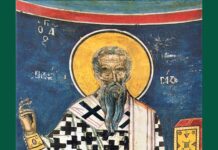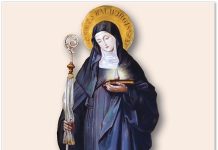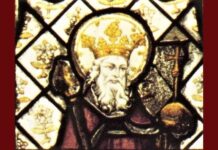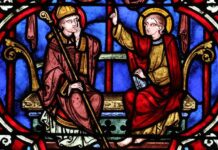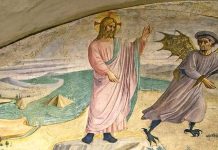Tuesday of the 30th Week in Ordinary Time
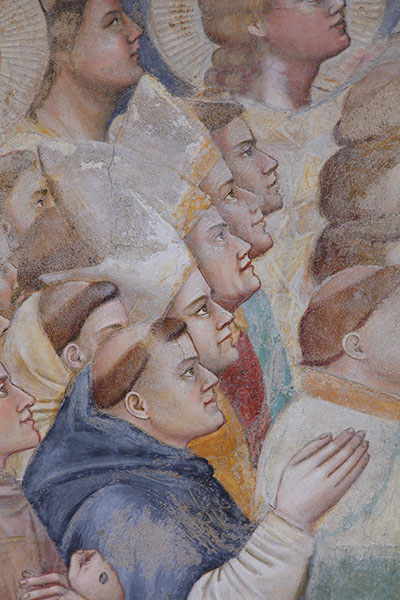 Featured Saints
Featured Saints
St. Fulk, bishop (†1229). Born in Piacenza, Italy, of Scottish parents. Appointed Bishop of Pavia, where he founded schools and dedicated himself the the spiritual welfare of his flock, abstaining from political affairs.
St. Albinus, bishop. (†786). Benedictine monk of Anglo-Saxon origin, one of the companions of St Boniface in the Evangelization of Germany, appointed Bishop of Büraburg, Hesse.
St. Eata, bishop (†circa 686). Disciple of St. Aidan. After serving as abbot in several monasteries, he became Bishop of Hexham, England, without abandoning monastic asceticism.
St. Cedd, bishop (†664). A monk missionary to diverse regions of England. Ordained bishop of the East Saxons by St. Finan, he founded several churches and monasteries, including that of Lastingham, in Yorkshire. Brother of St. Chad. (Optional Memorial in England.)
St. Rusticus, bishop (†circa 461). He evangelized the people of the region of Narbonne, France, as head of that diocese, and took part in the Council of Ephesus which condemned Nestorianism.
St. Rogatianus, priest († third century). During the Decian persecution, St. Cyprian entrusted the administration of the Church of Carthage to him. Together with St. Felicissimus, he suffered many tribulations for the love of Christ’s name.
Sts. Lucian and Marcian, martyrs (†c. 250). According to tradition, for their Christian Faith they were burned alive in Izmit, Turkey, by order of the proconsul Sabinus, during the reign of Emperor Decius.
Blessed Damian of Fulcheri, priest (†1484). Dominican priest, untiring preacher in the regions of Ligouri, Lombardy and Emilia, Italy.
Blessed Bonaventure of Potenza, priest (†1711). Religious from the Order of Friars Minor Conventual; he was an outstanding preacher and favoured with mystical gifts .
Blessed Celine Chludzinska Borzecka, religious (†1913). She founded the Congregation of Sisters of the Resurrection of Our Lord Jesus Christ in Rome.
Mass Readings
First Reading – Rom 8:18-25
Brothers and sisters:
I consider that the sufferings of this present time are as nothing
compared with the glory to be revealed for us.
For creation awaits with eager expectation
the revelation of the children of God;
for creation was made subject to futility,
not of its own accord but because of the one who subjected it,
in hope that creation itself
would be set free from slavery to corruption
and share in the glorious freedom of the children of God.
We know that all creation is groaning in labor pains even until now;
and not only that, but we ourselves,
who have the firstfruits of the Spirit,
we also groan within ourselves
as we wait for adoption, the redemption of our bodies.
For in hope we were saved.
Now hope that sees for itself is not hope.
For who hopes for what one sees?
But if we hope for what we do not see, we wait with endurance.
Responsorial Psalm – Ps 126:1b-2ab, 2cd-3, 4-5, 6 (R.3a)
R. The Lord has done marvels for us.
When the LORD brought back the captives of Zion,
we were like men dreaming.
Then our mouth was filled with laughter,
and our tongue with rejoicing. R.
Then they said among the nations,
“The LORD has done great things for them.”
The LORD has done great things for us;
we are glad indeed. R.
Restore our fortunes, O LORD,
like the torrents in the southern desert.
Those that sow in tears
shall reap rejoicing. R.
Although they go forth weeping,
carrying the seed to be sown,
They shall come back rejoicing,
carrying their sheaves. R.
Gospel – Lk 13:18-21
Jesus said, “What is the Kingdom of God like?
To what can I compare it?
It is like a mustard seed that a man took and planted in the garden.
When it was fully grown, it became a large bush
and the birds of the sky dwelt in its branches.”
Again he said, “To what shall I compare the Kingdom of God?
It is like yeast that a woman took
and mixed in with three measures of wheat flour
until the whole batch of dough was leavened.”


